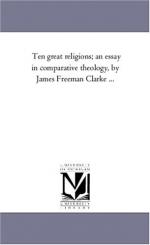|
This section contains 4,882 words (approx. 17 pages at 300 words per page) |

|
Dictionary of Literary Biography on James Freeman Clarke
In recent historiography, the name of James Freeman Clarke usually occurs in connection with the movement of religious reform and literary emergence known as American Transcendentalism. Among the young Unitarian ministers sympathetic to the new Romantic views of the 1830s, however, Clarke typified those who espoused a more conservative church-based brand of Transcendentalist vision. In marked contrast to Ralph Waldo Emerson, who resigned his pastorate in 1832 and subsequently moved beyond the pale of the Christian churches altogether, or Theodore Parker, who, while remaining active in the ecclesiastical life of Boston, embraced a form of radical post-Christian theology, Clarke quietly insisted on the privileged place of Jesus for the life of faith and remained active in his denomination until the end of his long career in the ministry. A close friend and contemporary of several leaders of the movement--including Margaret Fuller, William Henry Channing, and Frederic Henry Hedge--Clarke contributed...
|
This section contains 4,882 words (approx. 17 pages at 300 words per page) |

|


